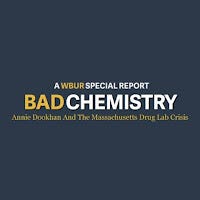"Bad Chemistry" documents Annie Dookhan and the Mass. drug lab crisis

“Bad Chemistry” Annie Dookhan And The Massachusetts Drug Lab Crisis:
In August 2012, Massachusetts officials closed the Hinton state drug lab in Jamaica Plain because a then-obscure chemist allegedly “failed to follow testing protocols” while testing drugs related to criminal cases. That chemist is no longer obscure: Annie Dookhan is now frequently mentioned by lawyers, judges, police and criminal defendants who refer to the cases she handled as “Dookhan cases.”
Dookhan has been criminally charged with deliberately manipulating drug tests at the lab, compromising at least 34,000 cases. Authorities allege:
that Dookhan did not test all drug samples (yet claimed she had);
that she deliberately tainted drug evidence;
that she mixed evidence so it would test positive for drugs when it was actually clean;
and that she forged signatures on drug testing paperwork.
Read the charges against Dookhan here.
State Attorney General Martha Coakley has said Dookhan’s actions “corrupted the integrity of the entire criminal justice system.”
The evidence against Dookhan also raises questions about the role of a state chemist. The evidence includes hundreds of emails showing that Dookhan regularly communicated with prosecutors about her testing. Dozens of emails from former Norfolk County prosecutor George Papachristos, for example, indicate that he and Dookhan regularly talked about the drug tests for his cases and that she often told him about her personal life. Papachristos resigned after the emails became public, raising debate over what constitutes appropriate communication between a prosecutor and a testing chemist.
Dookhan’s immediate supervisors were fired for not looking into why she was routinely testing thousands more drug samples than other chemists during her nine years at the lab. The head of the state Department of Public Health resigned in September 2012, calling Dookhan “a rogue chemist” for whom he was ultimately responsible. So far, five people have lost their jobs and others remain suspended as authorities investigate.
The ripple effects of the potentially bogus testing are staggering for the criminal justice system and for the defendants. As authorities review the cases involved, they’re also considering cases where defendants received stiffer sentences because of previous offenses. Or cases where defendants risked or lost jobs, public housing, custody of their children, or deportation.
District attorneys have set up “war rooms” in their offices just so staffers can research and match the cases in which Dookhan tested the drug evidence. They’ve hired retired judges to preside over dozens of special court sessions to review each case and decide whether to release those incarcerated and/or hold new trials.
Several simultaneous investigations are ongoing. Attorney General Coakley is pursuing the criminal case against Dookhan. The state inspector general is looking at lab operations. Gov. Deval Patrick has appointed attorney David Meier to review the affected cases. Essentially they want to pinpoint the extent of the bad tests and determine whether all drug testing done at the Hinton lab should be considered tainted and possibly whether to dismiss all criminal cases connected to the lab.
The state’s highest court is also being asked to weigh in. Defense attorneys want the Supreme Judicial Court to order all cases in which Dookhan was involved to be presumed tainted. Prosecutors are challenging the authority of the special court sessions reviewing the potentially compromised cases. (Read the motions before the SJC here.) Without yet issuing a full opinion, the SJC said that a Superior Court judge has the authority to change the sentences in so-called “Dookhan cases” but a special magistrate does not.
As of early spring 2013, judges have reviewed about 1,200 cases believed to be affected, and as many as 286 defendants were released from custody under strict probation conditions. A handful of them have been re-arrested, including a Brockton man, Donta Hood, who was released early from jail in the fall of 2012 because Dookhan tested the drug evidence in his case. Hood was charged with murder in May. One defendant, Jeffrey Solomon, has filed a civil suit against the state, charging he was wrongfully convicted of dealing drugs tested by Dookhan.
“Bad Chemistry” is WBUR’s chronicling of the drug lab, the chemist and the justice system’s turmoil; the turmoil will likely take years and tens of millions of dollars to unravel.
We will continue to publish and update the information as the story unfolds.
http://badchemistry.wbur.org/


